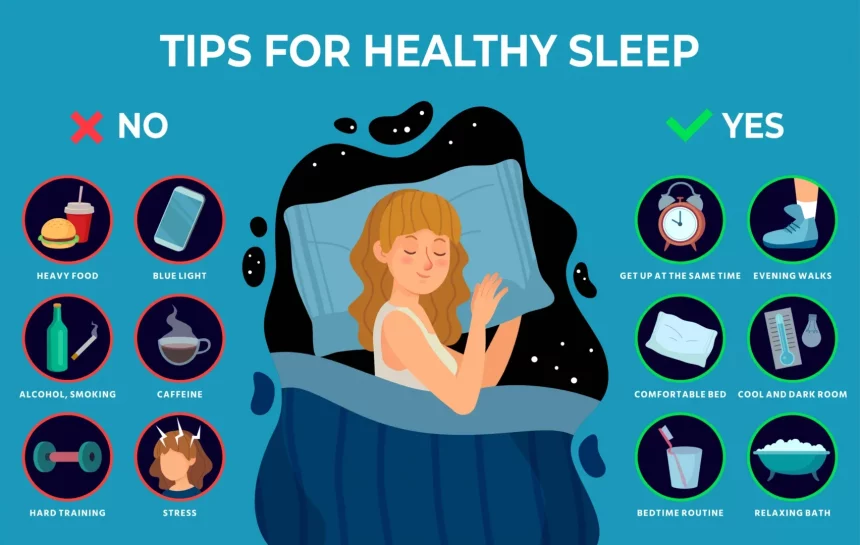Discover 10 powerful tips to improve your sleep quality naturally through science-backed sleep hygiene habits. Wake up refreshed and focused.
Good sleep is not a luxury—it’s a necessity. In an age of blue light, late-night stress, and disrupted routines, many people struggle with falling and staying asleep. That’s where sleep hygiene comes in. Sleep hygiene refers to the habits and environmental factors that promote better sleep. In this article, you’ll discover 10 proven tips to naturally enhance your sleep quality.
1. Stick to a Consistent Sleep Schedule
Going to bed and waking up at the same time every day—yes, even on weekends—regulates your body’s internal clock and improves sleep quality over time.
2. Limit Screen Time Before Bed
Blue light from phones, tablets, and TVs suppresses melatonin production. Try turning off screens at least 1 hour before sleep, or use blue light filters and night mode settings.
3. Create a Relaxing Bedtime Routine
Signal to your body that it’s time to unwind with relaxing activities like reading, light stretching, or a warm bath. Avoid stimulating tasks like checking emails or social media.
4. Optimize Your Sleep Environment
Keep your bedroom dark, quiet, and cool (around 18–20°C or 65–68°F). Use blackout curtains, white noise machines, and comfortable bedding to promote deeper sleep.
5. Avoid Caffeine and Alcohol Late in the Day
Caffeine can stay in your system for 6–8 hours. Similarly, while alcohol may help you fall asleep initially, it disrupts REM sleep and leads to fragmented rest.
6. Get Sunlight Exposure During the Day
Natural daylight helps reset your circadian rhythm. Aim for at least 30 minutes of sunlight exposure each morning for optimal sleep-wake cycle alignment.
7. Be Physically Active (But Not Too Late)
Regular exercise improves sleep, but avoid intense workouts close to bedtime. Try morning or early afternoon physical activity instead.
8. Watch Your Evening Meals
Heavy meals before bed can cause indigestion. Opt for light snacks if you’re hungry late at night—banana, yogurt, or almonds are good options.
9. Reserve Your Bed for Sleep (and Intimacy Only)
Train your brain to associate your bed only with sleep. Avoid working, watching TV, or using laptops in bed.
10. Manage Stress and Anxiety
Mindfulness, meditation, journaling, and breathing techniques can calm the mind and prepare your body for restful sleep. Chronic stress is a major disruptor of sleep health.
Related Reading:
- 10 Natural Remedies for Insomnia
- How Stress Affects Your Sleep and What to Do About It
Conclusion
Sleep hygiene is a long-term investment in your health, mood, and cognitive function. Start by choosing 2–3 tips from this list and gradually implement more over time. Your body—and brain—will thank you.





